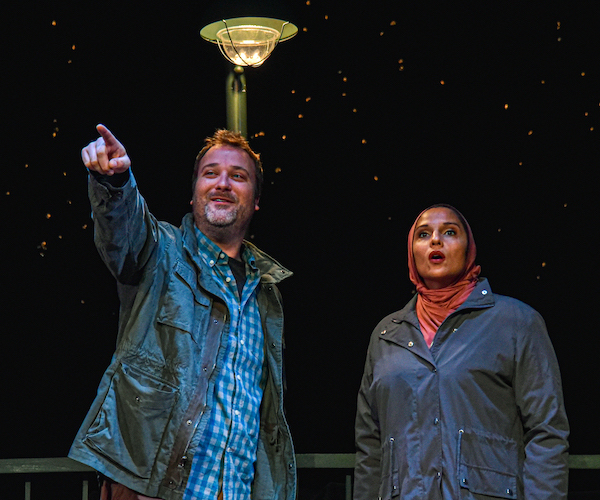Theater Review: “Mahida’s Extra Key to Heaven” — Conversation as an Act of Healing
By Jim Kates
Written more than a decade ago, Mahida’s Extra Key to Heaven falls all too painfully closely in line with current events.
Mahida’s Extra Key to Heaven by Russell Davis. Directed by Gus Kaikkonen. Staged by Peterborough Players, 55 Hadley Road, Peterborough, New Hampshire, through June 30.

Steven Michael Walters and Aliah Whitmore in “Mahida’s Extra Key to Heaven.” Photo: Lipofskyphoto.com
It is a pleasure to be able to write that Peterborough Players begins its 86th season smart, strong, thoughtful, and entertaining. If you are reading this review at some distance from southwestern New Hampshire, seriously consider an excursion to see Russell Davis’ Mahida’s Extra Key to Heaven.
The premise of the play centers on two young people who meet by chance in the evening at a ferry landing, waiting for a boat that will not come until morning. One of them starts talking. Thomas’s irrepressible, impossible loquacity sparks a dialogue that draws Mahida, an Iranian student, into a confidence first, and then to a dramatic confrontation with her brother in the second act. Although much of the conversation in Mahida’s Extra Key to Heaven is about cultural differences, the real subject of the play is not these disagreements. It is about talking itself — how we talk to one another or fail to talk, and what happens when talking breaks down.
The wariness with which Mahida (Aliah Whitmore) responds can not withstand the open insistence of Thomas (Steven Michael Walters). She hears him and she listens to him. The longer the play goes on the more she talks, and the quieter he becomes, until his last words come almost as a surprise. The other two characters, who talk but have far more trouble listening to each other, are Thomas’s mother Edna (Kathy Manfre) and Mahida’s brother Ramin (Adham Haddara).
Two other dialogues round out the action — Mahida pleads with her brother, painfully. Thomas (tutored by Mahida) engages with his mother, comic and reconciling.
Given a script that relies so much on these separate dialogues, a director has to know how to make conversation the action. Gus Kaikkonen is clever enough to keep the physical stasis from becoming static. When real movement breaks out, it explodes on stage with expressive shock.
Building drama out of cultural stereotypes can be dangerous, a danger mitigated only by the most sensitive acting. The trickiest role here is Ramin’s, who emerges as a smoldering ideologue convinced by his own calling. Haddara keeps him in check, establishing an uneasy, seething stillness that suddenly betrays itself. Whitmore’s reserve is gentler, and her opening up is warm and convincing.
I could have wished Walters more thoughtful. He seems to be delivering his lines rather than thinking before he speaks, but this may be more a question of pacing than of interpretation. In the first scene especially, when he is brash and intrusive, he also shows a genuine desire to be of service (how American!). He takes up a lot of time trying the patience of both Mahida and the audience. To ask him to take more time by thinking things through slowly might be making the wrong choice the production avoids.
When Manfre speaks as Thomas’s mother, the content of what she says is very different from her son’s, but Manfre makes it cleverly clear how closely they are related. They talk the same way. By nature compassionate and helpful, Edna spouts the line of American exceptionalism to Ramin as insistently as he pushes his own. But these two are obviously talking past each other, even as they rely on the same scripture
At the heart of Mahida’s Extra Key to Heaven is a parable Mahida is trying to write about two very different creatures, one without a shadow and the other without a reflection, who find in each other a traveling companion. In the story, as in the play, Mahida and Thomas do not quite become partners, but their heaven is just the other side of the wall, where the water is wide and calm.
Written more than a decade ago, Mahida’s Extra Key to Heaven falls all too painfully closely in line with current events. But not absolutely. In recent years we have learned to talk about the issues Davis addresses and the assumptions he makes — especially about cultural sensitivity and gender expectations — slightly differently than we used to in past years. (Mahida accepts Thomas’s assistance remarkably easily, for instance, without more than token bridling or uneasiness.)
It is one more credit to the Peterborough Players’ production that we do not founder on these differences, but follow the play’s own logic to its affirmative conclusion.
Jim Kates is a poet, feature journalist and reviewer, literary translator and the president and co-director of Zephyr Press, a non-profit press that focuses on contemporary works in translation from Russia, Eastern Europe, and Asia. His latest book is Paper-thin Skin (Zephyr Press), a translation of the Kazakhstani poet Aigerim Tazhi.
